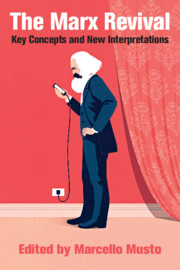Book contents
- The Marx Revival
- The Marx Revival
- Copyright page
- Contents
- About the Editor
- Contributors
- Preface
- Acknowledgements
- Note on the Text
- 1 Capitalism
- 2 Communism
- 3 Democracy
- 4 Proletariat
- 5 Class Struggle
- 6 Political Organization
- 7 Revolution
- 8 Work
- 9 Capital and Temporality
- 10 Ecology
- 11 Gender Equality
- 12 Nationalism and Ethnicity
- 13 Migration
- 14 Colonialism
- 15 State
- 16 Globalization
- 17 War and International Relations
- 18 Religion
- 19 Education
- 20 Art
- 21 Technology and Science
- 22 Marxisms
- Index
- References
7 - Revolution
Published online by Cambridge University Press: 29 May 2020
- The Marx Revival
- The Marx Revival
- Copyright page
- Contents
- About the Editor
- Contributors
- Preface
- Acknowledgements
- Note on the Text
- 1 Capitalism
- 2 Communism
- 3 Democracy
- 4 Proletariat
- 5 Class Struggle
- 6 Political Organization
- 7 Revolution
- 8 Work
- 9 Capital and Temporality
- 10 Ecology
- 11 Gender Equality
- 12 Nationalism and Ethnicity
- 13 Migration
- 14 Colonialism
- 15 State
- 16 Globalization
- 17 War and International Relations
- 18 Religion
- 19 Education
- 20 Art
- 21 Technology and Science
- 22 Marxisms
- Index
- References
Summary
The word ‘revolution’ was traditionally used to describe the movement of planets around their axis, but, after the sixteenth century, it became a political concept, describing radical upheavals in the social and political order, as well as the overthrowing of a ruling class or group. It is in this modern sense that Karl Marx used it. His main reference for thinking about revolutions was the French Revolution (1789–94): a massive popular uprising that deeply transformed the political institutions and social structure of France and Europe more broadly. Marx’s analyses of revolutionary events were always linked to the concept of class struggle. He referred to the Peasant Wars of the sixteenth century in Germany as a ‘peasant revolution’, to the English and French Revolutions as ‘bourgeois revolutions’, and to the Paris Commune of 1871 as a ‘proletarian revolution’. The revolutions of 1848–9 in France and Germany were perceived as a protracted class confrontation between the monarchist aristocracy, the liberal bourgeoisie, the democratic petty-bourgeoisie, and the proletarian masses.1
- Type
- Chapter
- Information
- The Marx RevivalKey Concepts and New Critical Interpretations, pp. 126 - 140Publisher: Cambridge University PressPrint publication year: 2020
References
- 2
- Cited by

